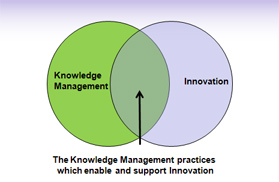 I had the pleasure of meeting "performance poet" Elvis McGonagal at the annual Henley KM Forum meeting last week. (Yes, he did wear that jacket.)
I had the pleasure of meeting "performance poet" Elvis McGonagal at the annual Henley KM Forum meeting last week. (Yes, he did wear that jacket.)
Elvis did a fantastic job of summarising the inputs from the likes of Bill Lucas from the Centre for Real World Learning at Winchester (who was inspirational), Leif Edvinsson, Raj Datta from Mindtree and Verna Allee, plus a number KM Forum projects from the last year - in a uniquely delivered poem.
He picked up from Vanessa Randle, of Thinking Visually, who has provided a brilliant visual summary of the conference for the last two years. This year Vanessa taught the forum participants how to draw- one of these days I'll post my attempts up here...
Here's the final offering from Elvis, entitled Mister Know-it-All:
I've eaten all the fruit from the tree of knowledge
I know what's what, I know who's who
I know my onions, I know the ropes
I know a thing or two
I know the way to Amarillo
I know the way to San Jose
I know who let the dogs out
I know the time of day
I know what happened to The Likely Lads
I know what happened to Baby Jane
I know what's eating Gilbert Grape
I know the rain in Spain falls mainly on the plain
I know who's been eating your porridge
I know who ate all the pies
I know which side my bread is buttered
I know the wheres, the whens, the whys
I know a hawk from a handsaw
I know chalk from cheese
I know they know it's Christmas
I know "thank you very much" in Japanese ("domo arrigato gazaimas")
I know where the bodies are buried
I know whodunnit, I know the score
I know what it's all about, Alfie
I know the capital of Ecuador (Quito)
I know how many roads a man must go down
I know where we go from here
I know why birds suddenly appear
Every time that you are near
I know the known knowns that I know I know
I know the unknown knowns that I don't
And as for Mr Rumsfeld's unknown unknowns -
Will I admit I don't know I don't know? No I won't
I know that unlike Barack Obama
Most politicians don't have a single scruple
I know that one of the speakers today
Used to be a roadie for Mott the Hoople
I'm a walking wikipedia
I'm a mobile reference library
I've got more knowledge than a London cabby
I know the quickest way from Highgate to Highbury
But little do you know that I know that you know
That I know what I know is no use
Unless I pass it on, put it over and get it across
There's no mileage in a mastermind recluse
For facts are fine as far as they go
As long as new ideas come from what we glean
Just knowing stuff is not enough
We gotta innovate - know what I mean?
And even if we know who wants to be a millionaire
We know they know that others must cooperate
That they'll have to ask the audience, they'll have to phone a friend
Communicate, convey, collaborate
We've got to work as a team, pull together
Join forces, pool resources, play ball
We gotta sail in the same boat baby
It's all for one and one for all
So - I know who put the "ram" in the "ramalamadingdong"
I know who put the "bop" in the "bop-sh-bop"
But the best piece of knowledge I'll share with you today is -
I know when to stop
by Elvis McGonagall
for the KM Forum Conference
January 2009




 I had the pleasure last week of spending two days in Bangalore with
I had the pleasure last week of spending two days in Bangalore with 
